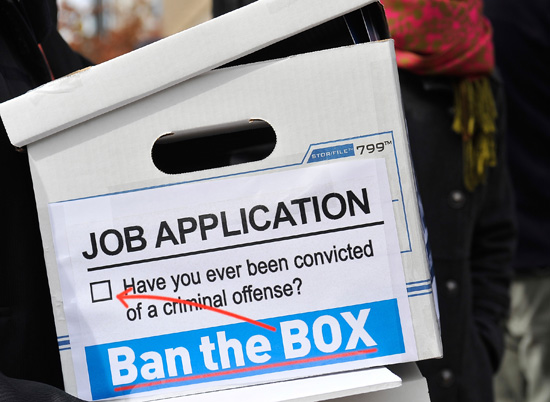Job Searching with a CORI Record/Criminal History
September 16, 2019 Leave a comment
 Recently, I was talking to an acquaintance about her job search and plans for the future. This individual has a checkered past and while the ‘history’ is not recent NOR was it involving any sort of violent behavior, there are many obstacles involved for individuals like her in getting hired with a CORI (Criminal Offender Record Information) record. This got me to thinking it might be of value to talk a little bit about how to address it in one’s search for employment.
Recently, I was talking to an acquaintance about her job search and plans for the future. This individual has a checkered past and while the ‘history’ is not recent NOR was it involving any sort of violent behavior, there are many obstacles involved for individuals like her in getting hired with a CORI (Criminal Offender Record Information) record. This got me to thinking it might be of value to talk a little bit about how to address it in one’s search for employment.
First of all, some ‘nuts and bolts’ to the topic! Several protections apply when individuals with CORI records seek employment and it’s helpful to know the ground you stand on.
What employers cannot ask:
1) State law prohibits most employers from asking about an applicant’s criminal history on an initial job application. Some employers are permitted to ask about an applicant’s criminal history for jobs that involve working with young children or financial institutions
2) Employers cannot ask an applicant or employee to provide a copy of his or her own criminal offender record information (CORI) or arrest records
3) At any stage of the hiring process, state law prohibits most employers from asking about:
– Criminal cases that did not end in a conviction
– An arrest or detention (e.g. being held at a police station) that did not end in a conviction
– A first conviction for drunkenness, simple assault, speeding, minor traffic violations, affray, or disturbance of the peace
– Convictions for a misdemeanor where the date of the conviction or the release from incarceration was 5 or more years ago, provided there were no subsequent convictions in the last 5 years
– Juvenile records, except for juvenile cases that transferred from the juvenile court to an adult court and where the juvenile was tried as an adult
– Sealed criminal records that can be reported as “no record”
The only time when an employer may ask about criminal convictions is:
1) If the applicant is applying for a position for which certain convictions disqualify the applicant under state or federal law
2) If the employer is prohibited by state or federal law from employing individuals who have been convicted of certain criminal offenses
3) State agencies must wait until the final stage of the hiring process to ask questions about criminal records
What employers are permitted to ask:
After the initial job application, employers can ask an applicant about:
1) Felony convictions at any time
2) Misdemeanor convictions that were not first-time convictions for drunkenness, simple assault, speeding, a minor traffic violation, an affray, or disturbing the peace
3) Employers must obtain an applicant’s written permission before accessing his or her CORI records.
4) If an employer makes an adverse decision based on an applicant’s CORI (e.g. a decision not to hire the applicant), the employer is required to give the applicant notice and provide the applicant with a copy of his or her CORI.
5) If an employer obtains criminal history information through a “consumer report” prepared by a consumer reporting agency and takes any adverse action based on that information obtained, the applicant is entitled to notice and a copy of the report, as well as an opportunity to correct/explain any errors.
When Involving Sealed records:
A job applicant whose criminal records are sealed does not have to provide an employer with any information about the sealed case or charge(s) at any stage of the hiring process.
In response to any inquiries regarding a sealed criminal case or charge, a job applicant may answer that he or she has “No Record.”
Sealed criminal records cannot be used to disqualify an applicant for employment with the Commonwealth or any political subdivision thereof.
Individual review of criminal history information:
Employers that have a policy or practice of automatically rejecting any job applicant with a criminal record may be violating state and federal civil rights laws. Using criminal records in this way can have a disproportionate effect on protected groups, including racial minority groups.
In most cases, employers should conduct an individualized assessment before determining that a particular criminal record disqualifies an individual for a particular job. Considerations generally should include:
1) The facts or circumstances surrounding the offense or conduct
2) The number of offenses for which the individual was convicted
3) Age at the time of conviction, or release from prison
4) Evidence that the individual performed the same type of work, post-conviction, with the same or a different employer, with no known incidents of criminal conduct
5) The length and consistency of employment history before and after the offense or conduct
6) Rehabilitation efforts, such as education or training
7) Employment or character references and any other information regarding fitness for the particular position
So what does this mean for job applicants with past criminal convictions?
A company may have valid reasons for denying employment to an applicant based on his or her past criminal conviction, but if a company rejects a job candidate without considering these factors, it risks a discrimination claim.
Until a discrimination claim is filed, however, it remains only a risk. A job applicant must file an actual discrimination claim against the company to be entitled to relief or a remedy.
As job candidates with criminal backgrounds pursue employment, they should know their rights and discuss their convictions openly with employers when appropriate. Consider this:
• Several states have revised their laws on the expunging of criminal convictions. Depending upon the length of time that has passed since a conviction, individuals might be eligible to have their convictions set aside under state law.
• Some states and local governments have “ban-the-box” laws, which prohibit an employer from asking about convictions early in the application or interview process. If a state or locality has such a law and an employer asks about convictions, it is violating the law. If you are a job candidate in this situation, you should address it with the employer professionally. Use the opportunity to note that the conviction is not relevant to the position you’re applying for and you would be happy to discuss it at the appropriate time in the hiring process.
• The Fair Credit Reporting Act allows job candidates to request a copy of the results of a background check. They can ask for a copy to see what information the employer requested and how far back it looked. If the rejection was based on a conviction listed in the report, the employer must notify the job candidate. This, too, can open a dialogue.
• If employers say their policies do not allow for a job candidate with a criminal background to be considered for employment, they should explain how the candidate’s conviction is relevant, given EEOC guidance. While employers are not required to respond to a request for this information, this will at least give the job candidate a chance to explain the conviction and why it should not be considered in the hiring decision.
The tide has been turning to some degree, and many more employers, especially with a strong economy and labor is tough to find (particularly in the trucking industry), are realizing that some really good talent is being turned away and are committed to getting talent back to work by considering qualified individuals with criminal backgrounds.
But continued progress will take honest conversations. That means a job candidate may need to pre-emptively raise the issue of a conviction. One way to do this is to appeal to the company based on any public support it has expressed for candidates with criminal backgrounds. Applicants can include in a cover letter, for instance, that they are specifically interested in the company because of its public support and then take the opportunity to explain their situation and how their skills and experiences qualify them for the position.
It can be frustrating for those who have paid their debt to society to run into arbitrary roadblocks to employment. But educating themselves on the issues and discussing any hiring concerns openly and professionally with potential employers early in the process can help to reduce barriers to employment.


Please Share Us!